Intro
Learn 7 essential scorpion sting care tips, including pain relief, wound treatment, and prevention methods to minimize venom effects and promote healing from scorpion stings and bites.
Scorpion stings can be a painful and potentially dangerous experience, especially for individuals who are allergic to the venom or have pre-existing medical conditions. It is essential to know how to care for a scorpion sting to minimize the risk of complications and promote healing. In this article, we will discuss the importance of proper scorpion sting care and provide tips on how to manage the symptoms and prevent further problems.
Scorpion stings can cause a range of symptoms, from mild pain and swelling to severe reactions, such as anaphylaxis. The venom from a scorpion sting can also lead to long-term health issues, such as nerve damage or respiratory problems, if left untreated. Therefore, it is crucial to seek medical attention immediately if you experience any severe symptoms or if you are unsure about the severity of the sting. For most people, however, scorpion stings can be treated with basic first aid and self-care measures.
The key to effective scorpion sting care is to act quickly and follow the right steps to reduce the venom's impact on the body. This includes removing any constricting items, cleaning the affected area, and applying a cold compress to reduce pain and swelling. Additionally, it is essential to monitor the individual's symptoms and seek medical attention if they worsen or if the person experiences any severe reactions. By following these simple steps, you can help minimize the risk of complications and promote healing.
Understanding Scorpion Stings
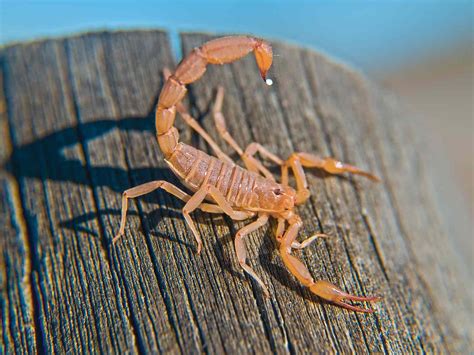
Types of Scorpions
There are over 2,000 species of scorpions, but only a few are venomous to humans. The most venomous scorpions belong to the Buthidae family, which includes the deathstalker scorpion and the bark scorpion. These scorpions are found in various parts of the world, including the Middle East, North Africa, and the southwestern United States. Other species, such as the striped bark scorpion, are less venomous but can still cause significant pain and discomfort.Scorpion Sting Care Tips
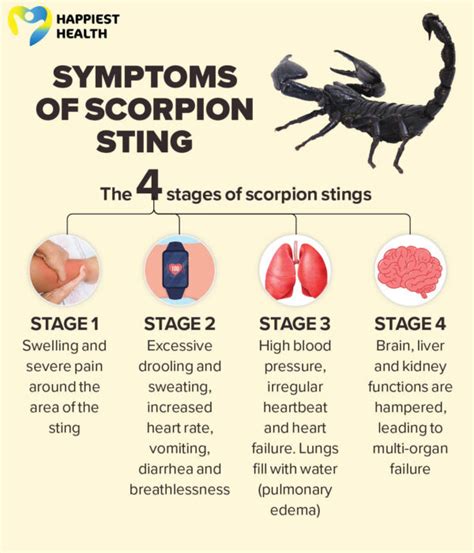
When to Seek Medical Attention
While most scorpion stings can be treated with basic first aid and self-care measures, there are situations where medical attention is necessary. If you experience any of the following symptoms, seek medical attention immediately: * Severe pain or swelling that does not respond to treatment * Difficulty breathing or swallowing * Abnormal heart rhythms or palpitations * Numbness or tingling in the face, arms, or legs * Drooping eyelids or facial weakness * Slurred speech or confusionPreventing Scorpion Stings

Scorpion Sting Treatment
If you are stung by a scorpion, it is essential to act quickly to minimize the venom's impact on the body. Here are the steps to follow: 1. Remain calm and still to prevent the venom from spreading. 2. Remove any constricting items, such as jewelry or watches. 3. Clean the affected area with soap and water. 4. Apply a cold compress to reduce pain and swelling. 5. Take over-the-counter pain medication, such as acetaminophen or ibuprofen, to manage pain and inflammation.Scorpion Sting Symptoms
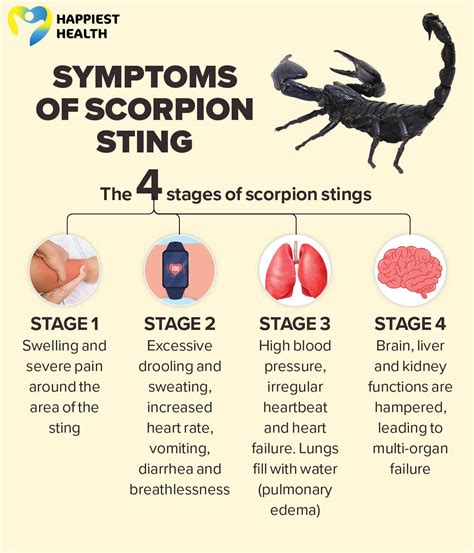
Scorpion Sting Home Remedies
While there are many home remedies for scorpion stings, it is essential to exercise caution and avoid using any treatments that can worsen the symptoms or cause further complications. Here are some home remedies that may help alleviate the symptoms: * Apply a cold compress to reduce pain and swelling. * Take over-the-counter pain medication, such as acetaminophen or ibuprofen, to manage pain and inflammation. * Elevate the affected area to reduce swelling and promote healing. * Use topical creams or ointments, such as lidocaine or capsaicin, to numb the area and reduce pain.Scorpion Sting First Aid
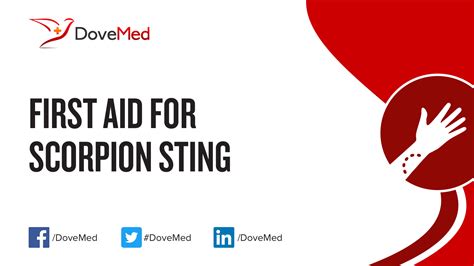
Scorpion Sting Treatment Options
While most scorpion stings can be treated with basic first aid and self-care measures, there are situations where medical attention is necessary. Here are some treatment options for scorpion stings: * Over-the-counter pain medication, such as acetaminophen or ibuprofen, to manage pain and inflammation. * Topical creams or ointments, such as lidocaine or capsaicin, to numb the area and reduce pain. * Antihistamines or corticosteroids to reduce swelling and alleviate symptoms. * Oxygen therapy or respiratory support to manage breathing difficulties.Scorpion Sting Prevention and Treatment
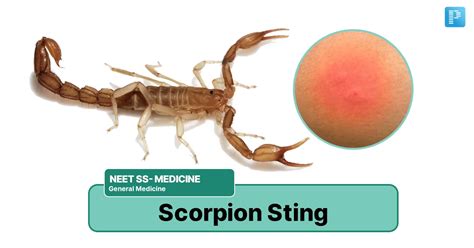
Scorpion Sting Complications
While most scorpion stings are not life-threatening, there are situations where complications can arise. Here are some potential complications of scorpion stings: * Anaphylaxis, a severe allergic reaction that can cause difficulty breathing, swallowing, or speaking. * Respiratory distress, which can lead to respiratory failure if left untreated. * Cardiac problems, such as abnormal heart rhythms or palpitations. * Neurological problems, such as numbness, tingling, or drooping eyelids.What should I do if I get stung by a scorpion?
+Remain calm and still, remove any constricting items, clean the affected area with soap and water, and apply a cold compress to reduce pain and swelling.
How can I prevent scorpion stings?
+Wear protective clothing, use a flashlight to illuminate your path, avoid reaching or stepping into dark or hidden areas, seal any cracks or crevices in your home, and keep your home clean and clutter-free.
What are the symptoms of a scorpion sting?
+Pain or burning sensation at the site of the sting, swelling or redness around the affected area, numbness or tingling in the face, arms, or legs, drooping eyelids or facial weakness, slurred speech or confusion, abnormal heart rhythms or palpitations, and difficulty breathing or swallowing.
When should I seek medical attention for a scorpion sting?
+Seek medical attention immediately if you experience any severe symptoms, such as difficulty breathing, swallowing, or speaking, abnormal heart rhythms or palpitations, numbness or tingling in the face, arms, or legs, drooping eyelids or facial weakness, or slurred speech or confusion.
How can I treat a scorpion sting at home?
+Apply a cold compress to reduce pain and swelling, take over-the-counter pain medication, such as acetaminophen or ibuprofen, to manage pain and inflammation, and elevate the affected area to reduce swelling and promote healing.
In conclusion, scorpion sting care is essential in minimizing the risk of complications and promoting healing. By following the tips outlined in this article, you can help manage the symptoms and prevent further problems. Remember to remain calm and still, remove any constricting items, clean the affected area with soap and water, and apply a cold compress to reduce pain and swelling. If you experience any severe symptoms or are unsure about the severity of the sting, seek medical attention immediately. We hope this article has provided you with the necessary information to care for a scorpion sting effectively. If you have any further questions or concerns, please do not hesitate to comment or share this article with others.
